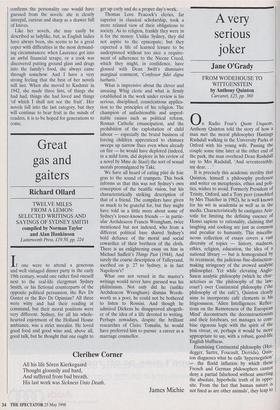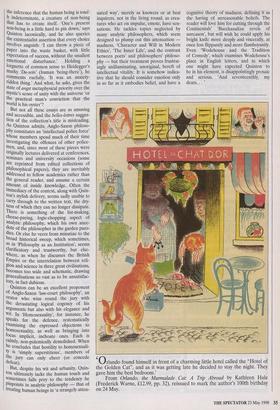A very serious joker
Jane O'Grady
FROM WODEHOUSE TO WITTGENSTEIN by Anthony Quinton Carcanet, £25, pp. 360 0 n Radio Four's Quote Unquote, Anthony Quinton told the story of how a man met the moral philosopher Hastings Rashdall walking in the University Parks at Oxford with his young wife. Passing the couple some time later at the other end of the park, the man overhead Dean Rashdall say to Mrs Rashdall, 'And seventeenthly, my dear. . . '
It is precisely this academic sterility that Quinton, himself a philosophy professor and writer on metaphysics, ethics and poli- tics, wishes to avoid. Formerly President of Trinity, Oxford, and a Tory peer (ennobled by Mrs Thatcher in 1982), he is well known for his wit in academia as well as in the media. Characteristically he castigates Aris- totle for limiting the defining essence of Homo sapiens to rationality, claiming that laughing and cooking are just as common and peculiar to humanity. This miscella- neous collection of essays covers a vast diversity of topics — history, madness, ethics, religion, education, the idea of a national library — but is homogenised by its treatment, the judicious fine-distinction- making stringency of the avowed analytic philosopher. Yet while elevating Anglo- Saxon analytic philosophy (which he char- acterises as 'the philosophy of the law- court') over Continental philosophy (`the philosophy of the café'), Quinton clearly aims to incorporate café elements in his litigiousness. 'Alien Intelligences: Reflec- tions on the Remoteness of the European Mind' deconstructs the deconstructionists and their forebears, yet manages to com- bine rigorous logic with the spirit of the bon viveur, or, perhaps it would be more appropriate to say, with a robust, good-life English bluffness. Examining Continental philosophy (Hei' degger, Sartre, Foucault, Derrida), Quin-, ton diagnoses what he calls 'hypemegation — the florid inflation by which these French and German philosophers cannot deny a partial falsehood without asserting the absolute, hyperbolic truth of its oppo: site. From the fact that human nature is not fixed as are other animals', they leap to the inference that the human being is total- 1Y indeterminate, a creature of non-being that has to create itself. 'One's present non-being is a little hard to pin down,' says Quinton laconically, and he also queries the existentialist assertion that every choice involves anguish: 'I can throw a piece of Paper into the waste basket, with little expectation of success, without the smallest emotional disturbance.' Holding a lorgnette of common sense to Heidegger's murky Da-sein' (human 'being-there'), he comments ruefully, 'It was an anxiety- ridden thing.' And what, he asks, gives the state of angst metaphysical priority over the Mystic's sense of unity with the universe 'or the practical man's conviction that the world is his oyster'? But not all these essays are as amusing and accessible, and the belles-lettres sugges- tion of the collection's title is misleading. As Quinton admits, Anglo-Saxon philoso- phy constitutes an 'intellectual police force' Whose members spend much of their time investigating the offences of other police- men, and, since most of these pieces were originally lectures delivered at conferences, seminars and university occasions (some are reprinted from edited collections of philosophical papers), they are inevitably addressed to fellow academics rather than the general reader, and assume a certain amount of inside knowledge. Often the immediacy of the context, along with Quin- ton's stylish delivery, seems sadly unable to carry through to the written text, the dry- ness of which they can no longer dissipate. There is something of the list-making, cheese-paring, logic-chopping aspect of analytic philosophy, which his own anec- dote of the philosopher in the garden paro- dies. Or else he veers from minutiae to the broad historical sweep, which sometimes, as in 'Philosophy as an Institution', seems clarificatory and trustworthy, but else- where, as when he discusses the British Empire or the interrelation between reli- gion and science in three great civilisations, becomes too wide and schematic, drawing generalisations so vast as to be unsatisfac- tory, in fact dubious.
Quinton can be an excellent proponent of Anglo-Saxon 'law-court philosophy', an orator who wins round the jury with the devastating logical cogency of his arguments but also with his elegance and wit. In 'Homosexuality', for instance, he speaks for the defence, systematically examining the expressed objections to homosexuality, as well as bringing into focus implicit, inchoate ones. Each is calmly, non-polemically demolished. When he concludes that hostility to homosexuali- ty is 'simply superstitious', members of the jury can only cheer (or concede defeat).
But, despite his wit and urbanity, Quin- ton ultimately lacks the human touch and sometimes falls prey to the tendency he Pinpoints in analytic philosophy — that of treating human beings in 'a strangely atten- uated way', merely as knowers or at best inquirers, not in the living round, as crea- tures who act on impulse, emote, have sen- sations. He tackles topics neglected by many analytic philosophers, which seem designed to plump out this attenuation madness, 'Character and Will in Modern Ethics', 'The Inner Life', and the contrast between poets' and philosophers' philoso- phy — but their treatment proves frustrat- ingly unilluminating, unoriginal, bereft of intellectual vitality. It is somehow indica- tive that he should consider emotion only in so far as it embodies belief, and have a cognitive theory of madness, defining it as the having of unreasonable beliefs. The reader will love him for cutting through the Continentals' Bacchanalian revels of unreason', but will wish he could apply his bright knife more deeply and viscerally, at once less flippantly and more flamboyantly. Even 'Wodehouse and the Tradition of Comedy', which examines Wodehouse's place in English letters, and in which one might have expected Quinton to be in his element, is disappointingly prosaic and serious. 'And seventeenthly, my dears. '



































































 Previous page
Previous page